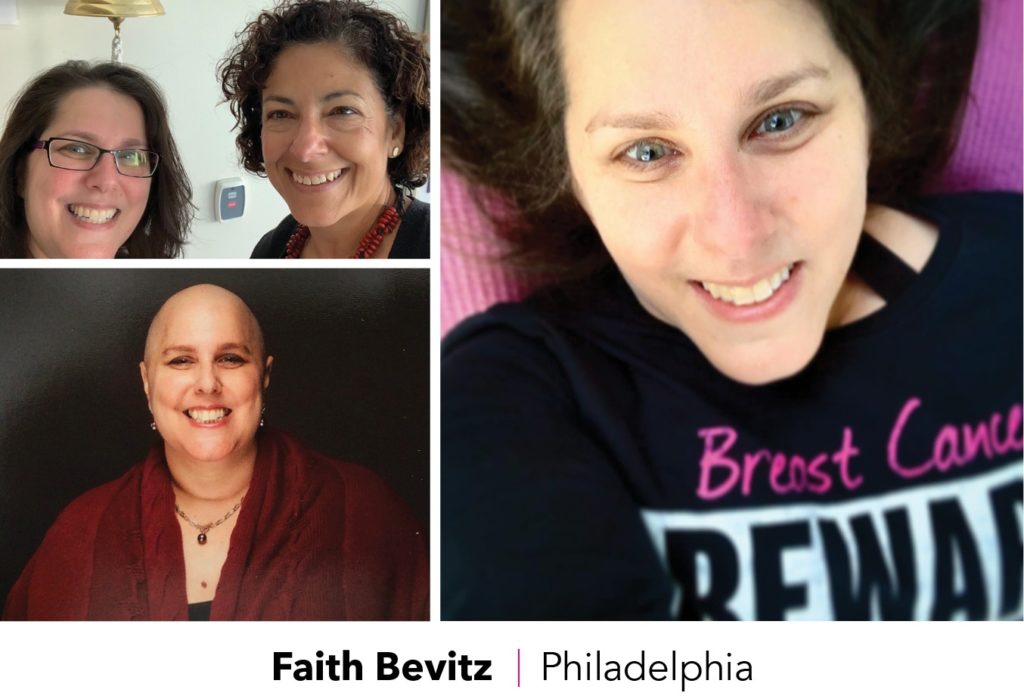 How did your breast cancer journey begin?
How did your breast cancer journey begin?
In October 2014, I had a busy day scheduled. As I was showering, I found my tumor. I started to scream and cry. When I calmed down, I called my local women’s health center, got a mammogram appointment, and continued with my busy day. My mammogram confirmed that I most likely had a tumor. The biopsy determined that I had triple-negative breast cancer. Within a month’s time frame, I had a lumpectomy.
I’m now 8 years out from being diagnosed and I want to help other people.
Support came from a variety of sources. Even though my friends and family supported me, only one friend and none of my family had cancer so they did not understand what I was going through. My college roommate and sorority sister is a triple-negative breast cancer survivor. She traveled to Philadelphia, spent a weekend with me and gave me a lot of hints about chemotherapy. I attended a few breast cancer support groups at my surgeon’s office. The best source of support was joining a few Facebook groups for people with triple-negative breast cancer. In those groups, I virtually met a woman who was approximately my age who lived in California who started chemotherapy a week after me. She became my phone-a-friend and the person I felt most comfortable sharing my innermost thoughts, fears, and side effects with.
What was the hardest challenge you faced?
Early on in my cancer diagnosis, I decided that I wanted to enjoy my life if I survived. As people in my Facebook groups passed away, I thought about ‘what if I became metastatic?’ When I got cording, I thought ‘what if my breast cancer had spread to my bones?’ When I had a lot of headaches, I thought ‘what if my breast cancer had spread to my brain?’ Those questions are very limiting and tend to paralyze me. I have learned that it is healthier to believe that I have a lot of life ahead of me and not to worry about things I cannot control. Sometimes it is easier said than done but I try my best to limit these thoughts.
Fill in the blank: “Breast cancer has taught me _________________”
…that I am a lot stronger than I thought that I was. Breast cancer has also made me more compassionate to people experiencing life difficulties and more grateful for the little things in my life. It also taught me that I need to put my health first.
Tell us about participating in the CLEVER clinical trial with PBCC Potamkin Prize Winner Dr. Angela DeMichele at PennMedicine.
About two years after my treatment was completed, my oncologist asked me to participate in a clinical study called CLEVER. CLEVER was being done at the University of Pennsylvania. The goal of CLEVER was to see if dormant breast cancer cells were living in my bone marrow. I had always heard that giving bone marrow was painful and I weighed that with the risk of a recurrence. I decided that I wanted to know that I had done everything possible in preventing a recurrence; so I signed up. One day, I got a phone call letting me know that dormant breast cancer cells were found in my bone marrow. While that was not the news that I had hoped for, I was happy that the University of Pennsylvania had a trial called Surmount, Surmount studied two FDA approved drugs in hopes of repurposing them to eliminate the dormant cells. I was the first patient that signed up. Signing up for a clinical trial was an easy decision since I wanted to reduce the risk of a recurrence. I was also hopeful that I would be helping future women with their treatment plans; just like the first people that decided to be part of trials for different breast cancer treatments that are now our standard of care.
Share a “bright spot” you experienced along the way.
During my port placement surgery, my surgeon told me about Unite for HER. I signed up for one of their Wellness Days and learned about how to take better care of myself. Their program and free services for women experiencing breast cancer is astonishing.
What is something you’d like other women facing breast cancer to know?
It gets better. When you get diagnosed with cancer, it is a big and confusing whirlwind of activity. When you are in treatment, there will be days that you feel sick and not like yourself. When treatment ends, there will be side effects that linger and hang around a lot longer than you expected. But one day, you will wake up and feel amazing.
You currently serve as the PBCC’s Philadelphia County Captain. What made you want to volunteer and what makes you so passionate about supporting our mission?
It saddens me that things like education, race, socioeconomic status and geographic location impacts the survival rate of breast cancer patients. I want to help so that all women have the same level of care and survivorship. Influencing our state laws is hopefully a way to create equality in care.
